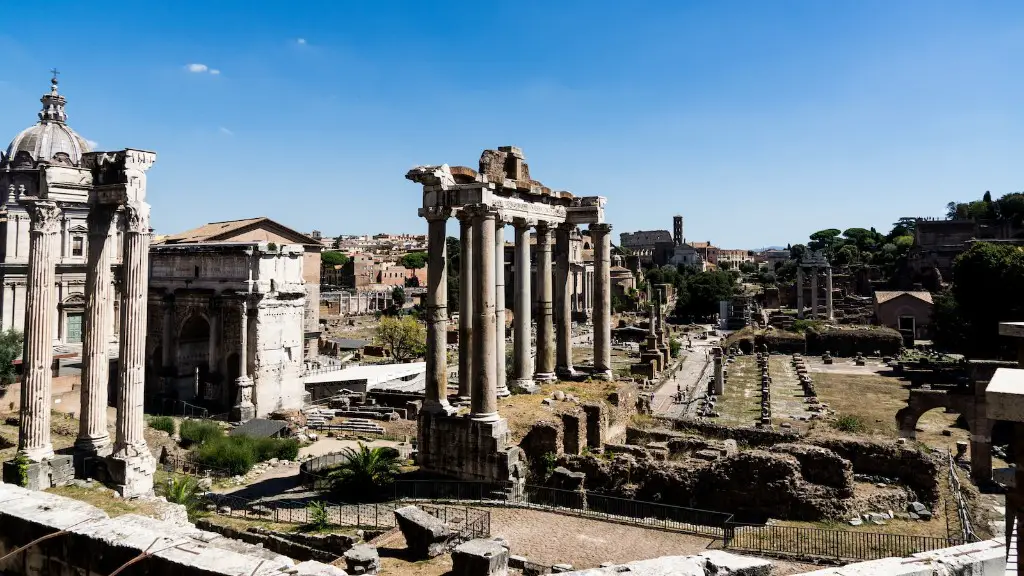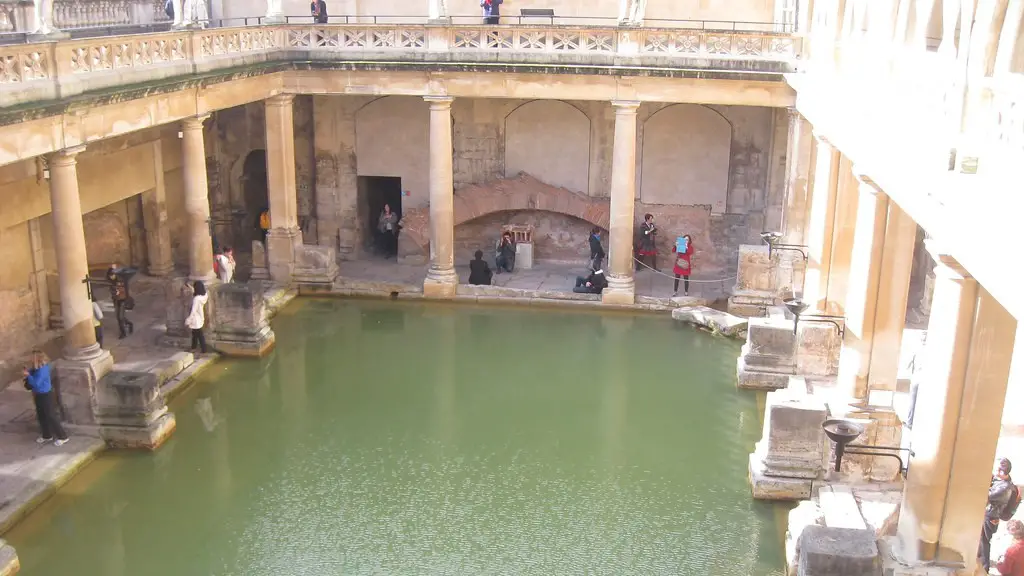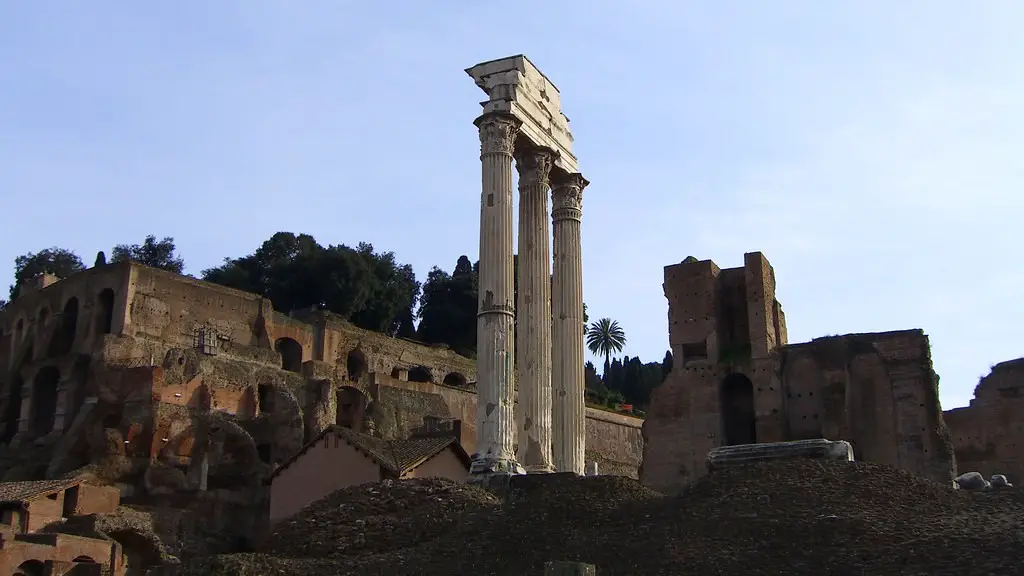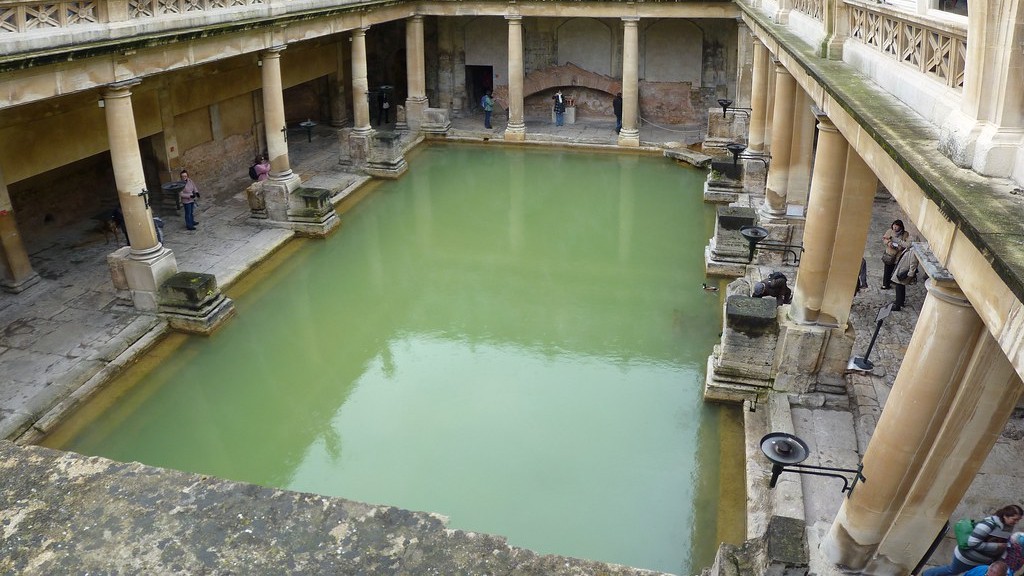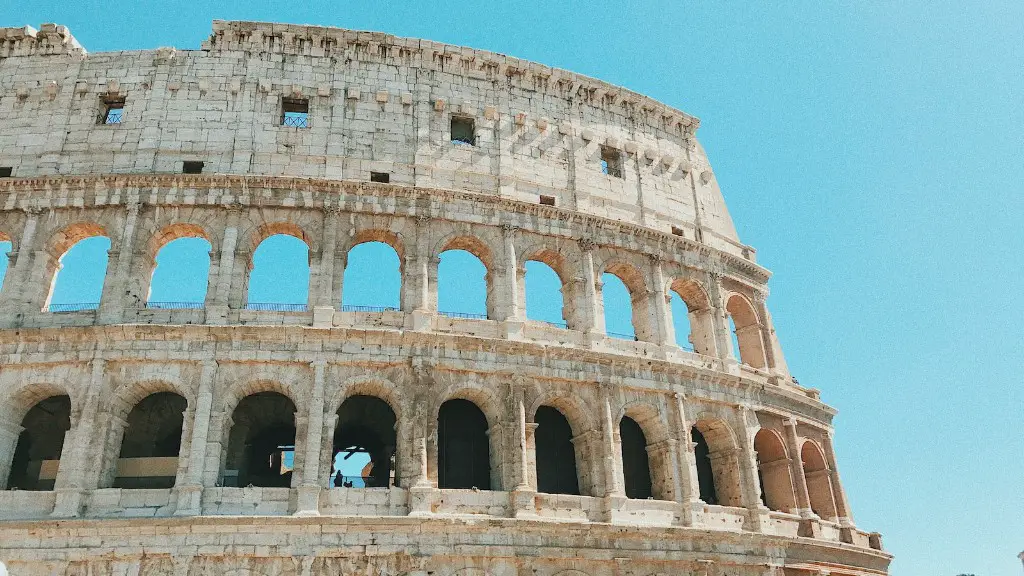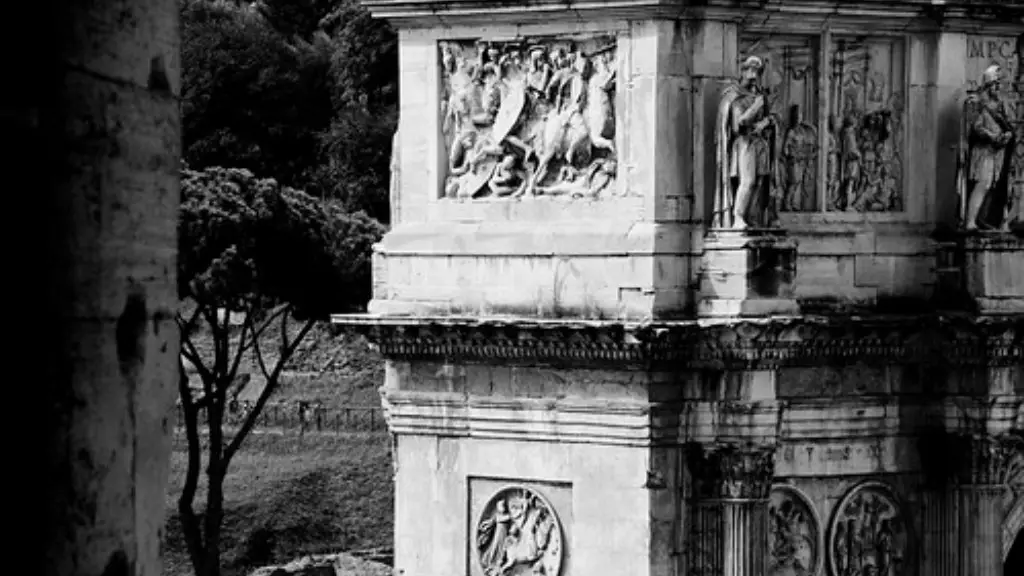Architecture
The Ancient Romans are well known for their impressive architectural feats, many of which can still be seen today. Their skill and ingenuity enabled them to build structures such as aqueducts, amphitheatres, bridges, and long roads. The most famous example of their engineering ability is the Colosseum, which was built in the 1st century AD and is considered one of the greatest works of Roman architecture. The Romans also constructed impressive monuments and temples, such as the Pantheon and Trajan’s Column. In addition to these large-scale projects, the Romans also developed many of the building techniques still in use today, including the arch, concrete, and arched ceilings.
The Romans had an aptitude for improving on existing technology. They took their basic Greek-style column design and improved it, forging a new type of column known as the “Corinthian column”. They were also the first to incorporate domes into their structures, an innovation that was initially proposed by the Greeks. Roman engineers also increased the use of arches in their architecture, incorporating them into bridges and building exteriors. The Romans also created a unique type of architecture known as basilican architecture, which was characterized by having large, rectangular halls and a long nave.
The Romans were incredibly resourceful in constructing their buildings. They used a variety of materials, including clay, stone, wood, and metal. They also created new methods of construction and developed the use of various tools such as pulleys and levers to make their job easier. Many of the construction methods they employed are still in use today.
The Romans were creative in their use of space, too. For example, to provide adequate lighting and ventilation, they would create atriums, as well as walled gardens. The Romans also had advanced plumbing systems, which allowed them to bring fresh water into their homes and public baths. In addition, they even had heated floors, which were kept warm by hot air circulating through channels beneath the floors.
Culture
The Ancient Romans had a vibrant and culturally rich society. They were experts in the arts of painting, sculpture, and architecture, and their work is admired to this day. The Romans had a deep appreciation for the written word and produced many works of literature. They also had a rich mythology, filled with mythical creatures, gods and goddesses, and ancient sagas. The Romans were fond of games and sports as well, and some of these, like chariot racing, have survived to this day.
The Ancient Greeks influenced the Romans in many ways. For example, their myths served as inspiration for Roman works, and many of their gods and goddesses were adopted into the Roman pantheon. Additionally, the Romans imitated Greek styles and techniques in architecture and the arts. Still, the Ancient Romans did make their own contributions to art and literature, particularly in the area of satire.
The Romans were also famous for their military prowess and their highly organised and disciplined armies. They were greatly impressed by the engineering skills of their soldiers, who were capable of constructing machines, roads, and fortifications. The Romans also played a key role in the development of politics and governance, having created the ancestor of today’s parliamentary system. They had a complex system of laws, which ensured fairness and consistency across their provinces.
The Romans established a strong civilization and culture with a lasting influence on the world. They developed lasting literary works, ushered in a new religion, left behind impressive architecture, and laid the foundation for politics and law. Roman art and culture can be seen around the world, from monuments and sculptures in Europe to freestanding statuaries in America.
Philosophy
The Ancient Romans believed in the pursuit of knowledge and the development of philosophical thought. They had a wide range of opinions on the proper way to live life, which included the appreciation of beauty, the pursuit of pleasure, and the veneration of the gods. The Romans respected creative thinking and supported the development of a free society. They also laid down a set of ethical principles, which formed the basis of their legal system.
The Romans were devoted to the pursuit of excellence, and this was reflected in their literature and art. They believed that by striving for excellence, humans could create a better world. This belief was reflected in the works of the influential Stoic philosopher, Lucius Annaeus Seneca. He believed that people should strive for perfection in order to achieve a state of happiness, and that virtue and justice should be the ultimate goals of life.
The Romans were devoted to the development of intellectual thought and to building an empire based on humanistic ideals. They were committed to the advancement of the sciences and, through the works of great thinkers such as Cicero and Pliny, made lasting contributions to the field of rhetoric and philosophy. The major philosophical schools of the Roman era, such as Stoicism and Epicureanism, are still studied today.
The Ancient Romans had a profound influence on the development of philosophy, literature, and art. They were a highly intelligent and creative civilization, and their contributions to the world extend far beyond their impressive engineering feats. They were devoted to the development of humanity and were able to create an empire lasting hundreds of years.
Government
The Ancient Romans had a complex and detailed system of government. At the top of the system was the emperor, who was granted absolute power. Under the emperor, there were two main branches of government: the Senate and the Assembly. The Senate was an advisory body, composed of elite members of Roman society, and was responsible for making laws and foreign policy. The Assembly was an elected body, responsible for electing and appointing officials, as well as ratifying treaties and passing laws.
The Romans had a well-developed system of justice, with a series of courts, both civilian and military. Trials were presided over by the emperor or a member of the Senate. The laws of the Roman Empire were based on the Twelve Tables, which set out legal principles and standards for citizens and officials alike. The Romans also had an extensive body of civil law, which dealt with matters such as inheritance and slavery.
The Roman government was highly bureaucratic, with a complex network of offices and officials who reported to the emperor and the Senate. This enabled the Romans to maintain tight control over the empire, which at its peak stretched from Britain to the Middle East, from North Africa to Germany. Despite its size and complexity, the Roman Empire was able to maintain a cohesive culture, which had an impact on the world for centuries to come.
The Ancient Romans were experts in the art of governing. They devised sophisticated systems of government, laws, and justice. They were also highly skilled at managing their vast empire, and they were able to create a unified culture that lasted for centuries. Their government and legal system are still studied today, and their influence on the world is still seen in many aspects of politics and law.
Religion
Religion played an important role in the Ancient Roman Empire, providing a guiding force in their lives and an explanation for the mysteries of the universe. The Romans initially worshipped a pantheon of gods and goddesses, derived from the Ancient Greeks. Over time, however, Roman religion diverged from Greek mythology, incorporating aspects of foreign religions, such as Egyptian and Etruscan. The most important religious figure in Rome was the emperor, who was believed to be a divine manifestation of the gods.
Religious rituals and ceremonies were an integral part of Roman society. They celebrated a number of festivals throughout the year and sacrificed animals in honour of the gods. They also visited oracles and consulted augurs to discern the will of the gods. In addition, the Romans had a vibrant cult of Mithras, which they were particularly devoted to, and they also revered a variety of other gods, such as Jupiter and Juno.
The Roman religion was highly influential, especially throughout the Mediterranean region. It provided a unifying force among the disparate peoples of the region, providing a common language, system of beliefs, and rituals. The Roman religion spread beyond the Roman Empire, influencing Christianity and the development of other major world religions, such as Islam.
The Ancient Romans were deeply religious, with a strong belief in their gods and goddesses. Their gods were a source of strength and comfort during trying times, and their festivals and rituals served to bring the people together. Religion also provided a moral code of conduct, and the Romans’ devotion to their gods was reflected in their art and literature.
Legacy
The Ancient Roman Empire had an immense impact on the world. The Roman legacy can be seen in the vast array of monuments, cities, and other works that still stand today. The colosseum in Rome and the Pantheon in Athens are two of the most iconic examples of this legacy. Roman achievements in engineering and architecture, such as the use of the arch and concrete, also still influence modern-day buildings and structures.
The Roman way of life has had a profound influence on the world, especially in terms of law and governance. Romans were one of the first civilizations to develop a written code of laws and were experts at forming alliances and treaties. Many aspects of their moral and political system, such as the concept of citizenship, are still relevant today. The Roman style of writing has also deeply impacted our language and is the source of many terms we still use.
The Ancient Romans have left a lasting legacy on the world. Their achievements in engineering, architecture, law, and governance have had a deep and lasting effect. Their style of writing and language have had a profound influence on our own, and their mythology and religion have continued to shape culture throughout the centuries.
The Ancient Romans have left a significant and lasting mark on the world. Their works, from literature and engineering to law and philosophy, still have a profound impact on our lives today. The Roman Empire will remain a powerful example of what a civilization can accomplish when it is devoted to the pursuit of progress and excellence.
